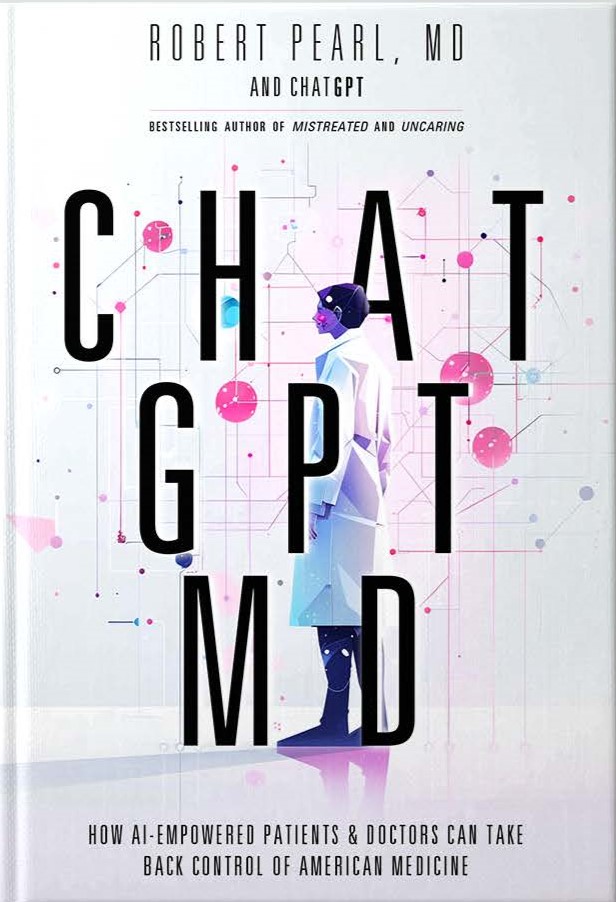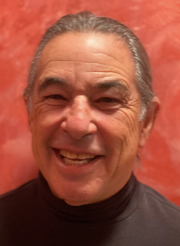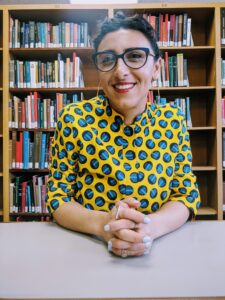The Future Of Artificial Intelligence In Healthcare
https://archives.kpfa.org/data/20240429-Mon1400.mp3
KPFA radio 94.1FM 4/29/24
We will discuss the transformative power of generative AI and how patients and doctors might be able to reclaim control of American medicine with improved patient outcomes and healthcare that is more accessible and affordable.
Will hospitals and staff be ready for this “medical miracle?” And are patients ready to trust something they don’t understand and that hasn’t been tested enough?
Call in at 1-800-958-9008 with your questions, concerns, and curiosity about the future of medical care with AI, doctors, and other health professionals, collaborating with you for better health.

Guest: ROBERT PEARL, M.D.
Dr. Robert Pearl was the CEO of The Permanente Medical Group (Kaiser Permanente) from 1999-2017. In this role he led 12,000 physicians, 42,000 staff, and was responsible for the nationally recognized medical care of over 5 million Kaiser Permanente members on the west and east coasts. His newest book, “ChatGPT, MD: How AI-Empowered Patients & Doctors Can Take Back Control of American Medicine” debuted as #1 on Amazon’s “New Best Seller” list. All profits from the book go to Doctors Without Borders. He is also the author of “Mistreated: Why We think We’re Getting Good Healthcare—And Why We’re Usually Wrong,” and “Uncaring: How the Culture of Medicine Kills Doctors and Patients,” published May 2021.
Pearl, named one of Modern Healthcare’s 50 most influential physician leaders, serves as a clinical professor of plastic surgery at Stanford University School of Medicine and is on the faculty of the Stanford Graduate School of Business.
He hosts the popular podcasts Fixing Healthcare and Medicine: The Truth, publishes a newsletter called Monthly Musings on American Healthcare, and is a regular contributor to Forbes.
Dr. Pearl received his medical degree from the Yale University School of Medicine and completed his residency at Stanford University. Connect with Dr. Robert Pearl on Twitter @RobertPearlMD, LinkedIn and at his website robertpearlmd.com.

Family Medicine During The Pandemic
Listen now! KPFA.org—94.1FM, 8/30/21
**https://kpfa.org/player/?audio=363073**
Have you been putting off going to your doctor for routine care because of Covid-19? Do you have questions about the vaccines or other medical issues. The doctor is in.
Guest:
Dr. Hiten Patel is a family medicine doctor at the Ohio State University Wexner Medical Center where he provides care to patients of all ages and across all care settings. He has special interest in disease prevention and telemedicine. He has a passion for the use of technology in health care and how technology can improve the health of communities.
Patel is a family medicine doctor at the Ohio State University Wexner Medical Center where he provides care to patients of all ages and across all care settings. He has special interest in disease prevention and telemedicine. He has a passion for the use of technology in health care and how technology can improve the health of communities.
He was the Chief Resident at Ohio State University Family Medicine Program and has been a Gold Humanism in Medicine Honor Society Member since 2017.
Uprooting Racism in Medicine: Where Do We Go From Here?
In the US, Black and other ethnic minority groups are hit the hardest by Covid-19, creating a renewed focus on racism in healthcare. There are so many false beliefs that many doctors and other healthcare providers still work from about Black people, such as their skin being thicker, their blood coagulating differently, and that they feel less pain. When doctors are blind to their racist beliefs and attitudes it can lead to less effective treatments, more pain, humiliation, and even death. It’s time that doctors, medical students, and other health care professionals take anti-racist study seriously and get support to see bias in themselves and in others.
On 1/18/21 we had a conversation on About Health (94.1FM KPFA.org) to discuss racism in medical care. We heard about personal experiences of racism and some of the history that has added to the mistrust of doctors based on racist practices. You can hear that show here: https://www.nurserona.com/racism-in-medical-care/ It seemed important to me to do a follow up show to continue the conversation.
What are ways to uproot racism in medicine?
Listen now to About Health on KPFA.org—94.1FM (3/22/21)
**https://kpfa.org/player/?audio=353495**
 Dr. Jeff Ritterman is a retired cardiologist from Kaiser Richmond where he worked for 29 years. He was also a Professor and Clinical Coordinator for the Physician Assistant Program at Touro University and worked for three years doing Adult Primary Care at Lifelong Medical in San Pablo. He is on the Board of Directors of San Francisco Physicians for Social Responsibility and served on the Richmond City Council when they introduced the first municipal Soda Tax. In the 1980s he helped start the Salvador Medical Relief Fund and the Committee for Health Rights in Central America. He personally delivered medical supplies to Salvador Refugees in Honduras and Costa Rica. In the 1990s he started the Southern Africa Medical Aid Fund and delivered medical supplies to the African National Congress’s Clinic in Lusaka, Zambia. He has helped start two Racial Equity Book Clubs, one with Kaiser Oakland and the other with San Francisco Physicians for Social Responsibility. He is the author of two recent papers on combating Medical Racism.You can read one of them here: http://www.thepermanentejournal.org/issues/2021/spring/7609-the-ally-book-club-a-tool-for-challenging-racism.html
Dr. Jeff Ritterman is a retired cardiologist from Kaiser Richmond where he worked for 29 years. He was also a Professor and Clinical Coordinator for the Physician Assistant Program at Touro University and worked for three years doing Adult Primary Care at Lifelong Medical in San Pablo. He is on the Board of Directors of San Francisco Physicians for Social Responsibility and served on the Richmond City Council when they introduced the first municipal Soda Tax. In the 1980s he helped start the Salvador Medical Relief Fund and the Committee for Health Rights in Central America. He personally delivered medical supplies to Salvador Refugees in Honduras and Costa Rica. In the 1990s he started the Southern Africa Medical Aid Fund and delivered medical supplies to the African National Congress’s Clinic in Lusaka, Zambia. He has helped start two Racial Equity Book Clubs, one with Kaiser Oakland and the other with San Francisco Physicians for Social Responsibility. He is the author of two recent papers on combating Medical Racism.You can read one of them here: http://www.thepermanentejournal.org/issues/2021/spring/7609-the-ally-book-club-a-tool-for-challenging-racism.html

Dr. Nadia Gaber is a postdoctoral fellow in the Program on Reproductive Health and the Environment, studying the influence of the chemical industry on the science and regulation of toxic chemicals. She received her PhD in medical anthropology and is obtaining her MD at UCSF with support from the NIH Medical Scientist Training Program. Her research in Detroit and Flint looked at the politics of urban health and safety in the U.S. through the lens of water. She is continuing to develop that research in a book project called Life After Water that blends ethnography, grassroots epidemiology and critical race theory. She is a member of the new UCSF REPAIR Project, a three-year initiative to combat anti-Black racism in the health sciences and has organized off-campus with groups like Critical Resistance and the Arab Resource and Organizing Center.
